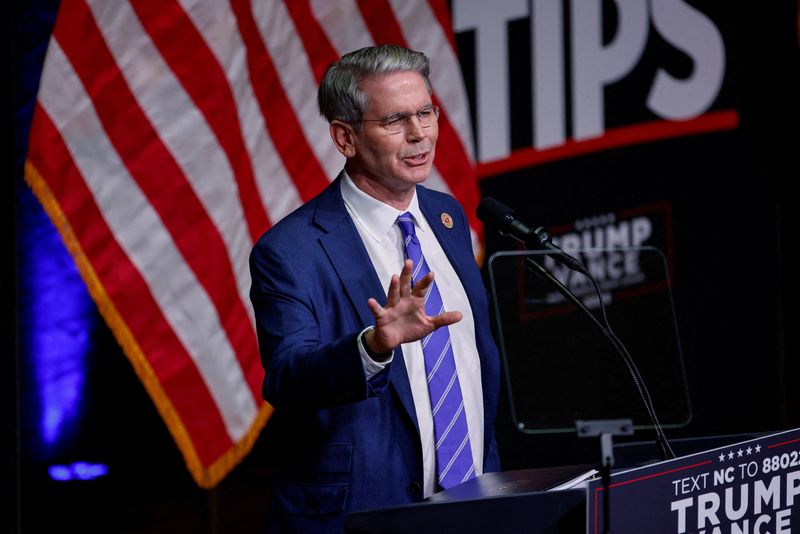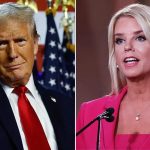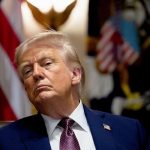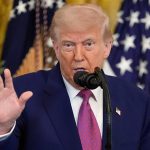
By Steve Holland and Alexandra Ulmer
(Reuters) -President-elect Donald Trump on Friday said he will nominate prominent investor Scott Bessent as U.S. Treasury secretary, ending days of twists that saw high profile candidates pitted against each other for the cabinet position with vast influence over economic, regulatory and international affairs.
Wall Street has been closely watching who Trump would choose, especially given his plans to remake global trade through tariffs and extend and potentially expand the raft of tax cuts enacted during his first term.
The choice of Bessent, 62, who has spent his career in finance, gives Wall Street an advocate for tax reform and deregulation. Some strategists said his nomination was a relief as he understands markets and his appointment could reduce the chance of severe tariffs.
The announcement – the most prominent of a flurry of Friday night appointments by Trump – caps a week where big name Wall Street luminaries’ chance at the job oscillated on a daily basis.
Other names that had been considered included Apollo Global Management (NYSE:APO) Chief Executive Marc Rowan and former Federal Reserve Governor Kevin Warsh. Investor John Paulson had also been a leading candidate, but dropped out, while Wall Street veteran Howard Lutnick, another contender, was appointed as head of the Commerce Department.
The choice came after days of deliberations by Trump as he sorted through a shifting list of candidates. Bessent spent day after day at Trump’s Mar-a-Lago home in Florida providing economic advice, sources said, a proximity to the president-elect that may have helped him prevail.
“Scott is widely respected as one of the world’s foremost international investors and geopolitical and economic strategists,” said Trump as he announced the nomination in a statement released on Truth Social.
FINANCE CAREER TO TREASURY
Bessent, from South Carolina, has spent his career in finance, working for macro investment billionaire George Soros and noted short seller Jim Chanos, as well as running his own hedge fund.
As a money manager, he made a large bet on Trump winning after spotting what he called an anomaly in the market – that political and market analysts were too negative on what a Trump victory would mean.
Bessent, who did not immediately respond to a request for comment, has advocated for tax reform and deregulation, particularly to spur more bank lending and energy production, as noted in a recent opinion piece he wrote for The Wall Street Journal.
The market’s surge after Trump’s election victory, he wrote, signaled investor expectations of “higher growth, lower volatility and inflation, and a revitalized economy for all Americans.”
“Bessent has been on the side of less aggressive tariffs,” said Oxford Economics’ Ryan Sweet, adding that picking him makes the steep tariffs Trump proposed on the campaign trail less likely.
Bessent follows other financial luminaries who have taken the job, including former Goldman Sachs executives Robert Rubin, Hank Paulson and Steven Mnuchin, Trump’s first Treasury chief. Janet Yellen, the current secretary and first woman in the job, previously chaired the Federal Reserve and White House Council of Economic Advisers.
ECONOMY’S QUARTERBACK
As Treasury secretary, Bessent will essentially be the highest-ranking U.S. economic official, responsible for maintaining the plumbing of the world’s largest economy, from collecting taxes and paying the nation’s bills to managing the $28.6-trillion Treasury debt market and overseeing financial regulation, including handling and preventing market crises.
The Treasury boss also runs U.S. financial sanctions policy, has influence over the U.S.-led International Monetary Fund, World Bank and other international financial institutions, and manages national security screenings of foreign investments in the United States.
Bessent will face challenges, including safely managing federal deficits that are forecast to grow by nearly $8 trillion over a decade due to Trump’s plans to extend expiring tax cuts next year and add generous new breaks, including ending taxes on Social Security income.
Without offsetting revenues, this new debt would add to an unsustainable fiscal trajectory already forecast to balloon U.S. debt by $22 trillion through 2033.
Managing debt increases this large without market indigestion will be a challenge, though Bessent has argued Trump’s agenda will unleash stronger economic growth that will grow revenue and shore up market confidence.
Bessent will also inherit the role carved out by Yellen to lead the Group of Seven wealthy democracies in providing tens of billions of dollars in economic support for Ukraine in its fight against Russia’s invasion and tightening sanctions on Moscow. But it is unclear whether he will pursue this, given Trump’s desire to end the war quickly and withdraw U.S. financial support for Ukraine.
Another area where Bessent will likely differ from Yellen is her focus on climate change, from her mandate that development banks expand lending for clean energy to incorporating climate risks into financial regulations and managing hundreds of billions of dollars in clean-energy tax credits.
Trump, a climate-change skeptic, has vowed to increase production of U.S. fossil fuel energy and end the clean-energy subsidies in President Joe Biden’s 2022 Inflation Reduction Act.
The Treasury secretary is also the administration’s closest point of contact with the Federal Reserve. Both Yellen under Biden and Mnuchin under Trump typically met weekly with Fed Chair Jerome Powell, often over breakfast or lunch.
Bessent has floated the idea of creating a “shadow” Fed chair. This would entail nominating as early as possible a presumptive Powell successor to the Fed Board who would then deliver their own policy guidance so that, as Bessent told Barron’s last month, “no one is really going to care what Jerome Powell has to say anymore.”
Bessent has since said he no longer thinks the idea of a shadow chair is worth pursuing, the Wall Street Journal reported.
Powell’s term as Fed chair expires in May 2026.
SOAP OPERA
Bessent, along with John Paulson, had been an early favorite for job earlier in the year according to a Reuters report at the time and seemed to be in pole position a week after election day, on Nov. 12, when Paulson exited the race citing “complex financial obligations”.
However, there were many twists in the race for the top position.
On Nov. 13, banker Howard Lutnick, who was leading a transition team to vet personnel and draft policy, emerged as a top contender. Lutnick, however, was taken out of the running after Trump nominated him to lead his trade and tariff strategy as head of the Commerce Department.
The pool of candidates then widened when Rowan, and former Federal Reserve Governor Kevin Warsh were under consideration as well as Republican U.S. Senator Bill Hagerty, sources with knowledge of the transition process said at the time.






